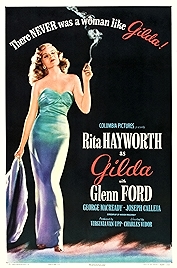A froth of noir, romance and melodrama aerated using Rita Hayworth as a whisk, Gilda exploits the star’s status as the number-one pinup girl for American troops fighting overseas during the Second World War.
It’s the Rita Hayworth movie, not just in the eyes of posterity but according to its own estimation of itself. “Starring Rita Hayworth” it says, alongside nobody else’s name in the opening credits, while a massive fanfare blares as the big, big sparkly letters dance on the screen. And, surely, what with Hayworth being a triple threat – she acts, she sings, she dances – this is going to deliver. Surely?
The noirish story focuses on a pair of grifters, Glenn Ford’s Johnny Farrell and Hayworth’s Gilda, who circle a casino owner in Buenos Aires, he as the boss’s new head of security, she as his wife. Johnny and Gilda were once an item, it turns out, and might be again, though the employer/employee rules of engagement, not to mention the marriage vows, stand in their way.
The boss/husband, Ballin Mundson, is played by George Macready with a faintly German accent, and since this film was made as the Second World War was coming to an end, that’s an indication that sympathies aren’t meant to be with Mundson, even though he’s largely a decent character who on the whole behaves well.
The same cannot be said about Gilda, a “the girl can’t help it” femme fatale – not so much a bad person as one who’s been diverted from the primrose path after tasting the power over men her looks have given her. “I’m going to do exactly what I please, when I please,” says the arrogant Gilda to Johnny as he makes one of his “for old time’s sake” plays for her affection.
The same cannot be said about Gilda, a “the girl can’t help it” femme fatale – not so much a bad person as one who’s been diverted from the primrose path after tasting the power over men her looks have given her. “I’m going to do exactly what I please, when I please,” says the arrogant Gilda to Johnny as he makes one of his “for old time’s sake” plays for her affection.
Hayworth’s performance is terrible. She huffs, she growls, she sticks her chest out in a simulation of what a femme fatale is meant to do. Watch her dancing with Fred Astaire in You’ll Never Get Rich if you want to see her in her element – as a loose-limbed slip of a thing – but here she’s all wrong. To be clear, she looks the part (she was the inspiration for Jessica Rabbit in Who Framed Roger Rabbit), but she just can’t manage the role of the woman who’s out for number one and selling her body to the highest bidder.
Ford is good though. He’s young, he’s flexible, his performance hasn’t solidified into the bag of Glenn Ford tics he’d offer in later films. And he keeps it up until he, too, starts to go slightly rigid in the film’s second half. “We were both stinkers, weren’t we?” Gilda says to Johnny towards the end of the film. And while it’s true of Hayworth, it’s not quite as applicable to him.
For no other reason than the boys out there fighting would enjoy it, Hayworth gets three musical numbers, only one of which can really be justified. She’s dubbed. And director Charles Vidor moves heaven and earth to inject excitement into a story that’s not exactly heaving with it naturally, swinging the camera in dramatically whenever some new revelation is made, while lighting cameraman Rudolph Maté also pulls out the stops, frequently silhouetting characters to indicate where our sympathies should lie.
Vidor and Maté are in tight with art directors Stephen Goosson and Van Nest Polglase (veteran of many an Astaire and Rogers musical), set designer Robert Priestley and costumier Jean Louis. This is a gorgeous-looking film, one of the high points of Old Hollywood of the black and white era.
This crack team of technicians know what they are meant to do and beat and whip away, folding air into this strange subversion of Hayworth’s status as a GI pinup. This was Hayworth’s first major dramatic role and it hung over her for the rest of her career. “They go to bed with Gilda and they wake up with me,” Hayworth would later grumble about lovers inevitably disappointed by the gap between fantasy and reality. She was right to complain and she eventually came to hate the movie.
Gilda – Watch it/buy it at Amazon
I am an Amazon affiliate
© Steve Morrissey 2023


